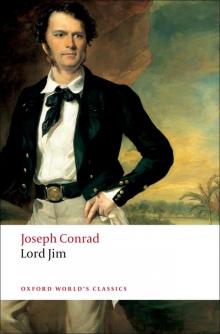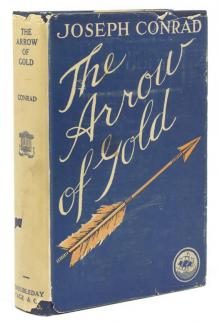- Home
- Joseph Conrad
The Rescue Page 2
The Rescue Read online
Page 2
He was about thirty-five, erect and supple. He moved freely, more like a man accustomed to stride over plains and hills, than like one who from his earliest youth had been used to counteract by sudden swayings of his body the rise and roll of cramped decks of small craft, tossed by the caprice of angry or playful seas.
He wore a grey flannel shirt, and his white trousers were held by a blue silk scarf wound tightly round his narrow waist. He had come up only for a moment, but finding the poop shaded by the main-topsail he remained on deck bareheaded. The light chestnut hair curled close about his well-shaped head, and the clipped beard glinted vividly when he passed across a narrow strip of sunlight, as if every hair in it had been a wavy and attenuated gold wire. His mouth was lost in the heavy moustache; his nose was straight, short, slightly blunted at the end; a broad band of deeper red stretched under the eyes, clung to the cheek bones. The eyes gave the face its remarkable expression. The eyebrows, darker than the hair, pencilled a straight line below the wide and unwrinkled brow much whiter than the sunburnt face. The eyes, as if glowing with the light of a hidden fire, had a red glint in their greyness that gave a scrutinizing ardour to the steadiness of their gaze.
That man, once so well known, and now so completely forgotten amongst the charming and heartless shores of the shallow sea, had amongst his fellows the nickname of "Red-Eyed Tom." He was proud of his luck but not of his good sense. He was proud of his brig, of the speed of his craft, which was reckoned the swiftest country vessel in those seas, and proud of what she represented.
She represented a run of luck on the Victorian goldfields; his sagacious moderation; long days of planning, of loving care in building; the great joy of his youth, the incomparable freedom of the seas; a perfect because a wandering home; his independence, his love—and his anxiety. He had often heard men say that Tom Lingard cared for nothing on earth but for his brig—and in his thoughts he would smilingly correct the statement by adding that he cared for nothing living but the brig.
To him she was as full of life as the great world. He felt her live in every motion, in every roll, in every sway of her tapering masts, of those masts whose painted trucks move forever, to a seaman's eye, against the clouds or against the stars. To him she was always precious—like old love; always desirable—like a strange woman; always tender—like a mother; always faithful—like the favourite daughter of a man's heart.
For hours he would stand elbow on rail, his head in his hand and listen—and listen in dreamy stillness to the cajoling and promising whisper of the sea, that slipped past in vanishing bubbles along the smooth black-painted sides of his craft. What passed in such moments of thoughtful solitude through the mind of that child of generations of fishermen from the coast of Devon, who like most of his class was dead to the subtle voices, and blind to the mysterious aspects of the world—the man ready for the obvious, no matter how startling, how terrible or menacing, yet defenceless as a child before the shadowy impulses of his own heart; what could have been the thoughts of such a man, when once surrendered to a dreamy mood, it is difficult to say.
No doubt he, like most of us, would be uplifted at times by the awakened lyrism of his heart into regions charming, empty, and dangerous. But also, like most of us, he was unaware of his barren journeys above the interesting cares of this earth. Yet from these, no doubt absurd and wasted moments, there remained on the man's daily life a tinge as that of a glowing and serene half-light. It softened the outlines of his rugged nature; and these moments kept close the bond between him and his brig.
He was aware that his little vessel could give him something not to be had from anybody or anything in the world; something specially his own. The dependence of that solid man of bone and muscle on that obedient thing of wood and iron, acquired from that feeling the mysterious dignity of love. She—the craft—had all the qualities of a living thing: speed, obedience, trustworthiness, endurance, beauty, capacity to do and to suffer—all but life. He—the man—was the inspirer of that thing that to him seemed the most perfect of its kind. His will was its will, his thought was its impulse, his breath was the breath of its existence. He felt all this confusedly, without ever shaping this feeling into the soundless formulas of thought. To him she was unique and dear, this brig of three hundred and fourteen tons register—a kingdom!
And now, bareheaded and burly, he walked the deck of his kingdom with a regular stride. He stepped out from the hip, swinging his arms with the free motion of a man starting out for a fifteen-mile walk into open country; yet at every twelfth stride he had to turn about sharply and pace back the distance to the taffrail.
Shaw, with his hands stuck in his waistband, had hooked himself with both elbows to the rail, and gazed apparently at the deck between his feet. In reality he was contemplating a little house with a tiny front garden, lost in a maze of riverside streets in the east end of London. The circumstance that he had not, as yet, been able to make the acquaintance of his son—now aged eighteen months—worried him slightly, and was the cause of that flight of his fancy into the murky atmosphere of his home. But it was a placid flight followed by a quick return. In less than two minutes he was back in the brig. "All there," as his saying was. He was proud of being always "all there."
He was abrupt in manner and grumpy in speech with the seamen. To his successive captains, he was outwardly as deferential as he knew how, and as a rule inwardly hostile—so very few seemed to him of the "all there" kind. Of Lingard, with whom he had only been a short time—having been picked up in Madras Roads out of a home ship, which he had to leave after a thumping row with the master—he generally approved, although he recognized with regret that this man, like most others, had some absurd fads; he defined them as "bottom-upwards notions."
He was a man—as there were many—of no particular value to anybody but himself, and of no account but as the chief mate of the brig, and the only white man on board of her besides the captain. He felt himself immeasurably superior to the Malay seamen whom he had to handle, and treated them with lofty toleration, notwithstanding his opinion that at a pinch those chaps would be found emphatically "not there."
As soon as his mind came back from his home leave, he detached himself from the rail and, walking forward, stood by the break of the poop, looking along the port side of the main deck. Lingard on his own side stopped in his walk and also gazed absentmindedly before him. In the waist of the brig, in the narrow spars that were lashed on each side of the hatchway, he could see a group of men squatting in a circle around a wooden tray piled up with rice, which stood on the just swept deck. The dark-faced, soft-eyed silent men, squatting on their hams, fed decorously with an earnestness that did not exclude reserve.
Of the lot, only one or two wore sarongs, the others having submitted—at least at sea—to the indignity of European trousers. Only two sat on the spars. One, a man with a childlike, light yellow face, smiling with fatuous imbecility under the wisps of straight coarse hair dyed a mahogany tint, was the tindal of the crew—a kind of boatswain's or serang's mate. The other, sitting beside him on the booms, was a man nearly black, not much bigger than a large ape, and wearing on his wrinkled face that look of comical truculence which is often characteristic of men from the southwestern coast of Sumatra.
This was the kassab or store-keeper, the holder of a position of dignity and ease. The kassab was the only one of the crew taking their evening meal who noticed the presence on deck of their commander. He muttered something to the tindal who directly cocked his old hat on one side, which senseless action invested him with an altogether foolish appearance. The others heard, but went on somnolently feeding with spidery movements of their lean arms.
The sun was no more than a degree or so above the horizon, and from the heated surface of the waters a slight low mist began to rise; a mist thin, invisible to the human eye; yet strong enough to change the sun into a mere glowing red disc, a disc vertical and hot, rolling down to the edge of the horizontal and cold-looking disc of the
shining sea. Then the edges touched and the circular expanse of water took on suddenly a tint, sombre, like a frown; deep, like the brooding meditation of evil.
The falling sun seemed to be arrested for a moment in his descent by the sleeping waters, while from it, to the motionless brig, shot out on the polished and dark surface of the sea a track of light, straight and shining, resplendent and direct; a path of gold and crimson and purple, a path that seemed to lead dazzling and terrible from the earth straight into heaven through the portals of a glorious death. It faded slowly. The sea vanquished the light. At last only a vestige of the sun remained, far off, like a red spark floating on the water. It lingered, and all at once—without warning—went out as if extinguished by a treacherous hand.
"Gone," cried Lingard, who had watched intently yet missed the last moment. "Gone! Look at the cabin clock, Shaw!"
"Nearly right, I think, sir. Three minutes past six."
The helmsman struck four bells sharply. Another barefooted seacannie glided on the far side of the poop to relieve the wheel, and the serang of the brig came up the ladder to take charge of the deck from Shaw. He came up to the compass, and stood waiting silently.
"The course is south by east when you get the wind, serang," said Shaw, distinctly.
"Sou' by eas'," repeated the elderly Malay with grave earnestness.
"Let me know when she begins to steer," added Lingard.
"Ya, Tuan," answered the man, glancing rapidly at the sky. "Wind coming," he muttered.
"I think so, too," whispered Lingard as if to himself.
The shadows were gathering rapidly round the brig. A mulatto put his head out of the companion and called out:
"Ready, sir."
"Let's get a mouthful of something to eat, Shaw," said Lingard. "I say, just take a look around before coming below. It will be dark when we come up again."
"Certainly, sir," said Shaw, taking up a long glass and putting it to his eyes. "Blessed thing," he went on in snatches while he worked the tubes in and out, "I can't—never somehow—Ah! I've got it right at last!"
He revolved slowly on his heels, keeping the end of the tube on the sky-line. Then he shut the instrument with a click, and said decisively:
"Nothing in sight, sir."
He followed his captain down below rubbing his hands cheerfully.
For a good while there was no sound on the poop of the brig. Then the seacannie at the wheel spoke dreamily:
"Did the malim say there was no one on the sea?"
"Yes," grunted the serang without looking at the man behind him.
"Between the islands there was a boat," pronounced the man very softly.
The serang, his hands behind his back, his feet slightly apart, stood very straight and stiff by the side of the compass stand. His face, now hardly visible, was as inexpressive as the door of a safe.
"Now, listen to me," insisted the helmsman in a gentle tone.
The man in authority did not budge a hair's breadth. The seacannie bent down a little from the height of the wheel grating.
"I saw a boat," he murmured with something of the tender obstinacy of a lover begging for a favour. "I saw a boat, O Haji Wasub! Ya! Haji Wasub!"
The serang had been twice a pilgrim, and was not insensible to the sound of his rightful title. There was a grim smile on his face.
"You saw a floating tree, O Sali," he said, ironically.
"I am Sali, and my eyes are better than the bewitched brass thing that pulls out to a great length," said the pertinacious helmsman. "There was a boat, just clear of the easternmost island. There was a boat, and they in her could see the ship on the light of the west—unless they are blind men lost on the sea. I have seen her. Have you seen her, too, O Haji Wasub?"
"Am I a fat white man?" snapped the serang. "I was a man of the sea before you were born, O Sali! The order is to keep silence and mind the rudder, lest evil befall the ship."
After these words he resumed his rigid aloofness. He stood, his legs slightly apart, very stiff and straight, a little on one side of the compass stand. His eyes travelled incessantly from the illuminated card to the shadowy sails of the brig and back again, while his body was motionless as if made of wood and built into the ship's frame. Thus, with a forced and tense watchfulness, Haji Wasub, serang of the brig Lightning, kept the captain's watch unwearied and wakeful, a slave to duty.
In half an hour after sunset the darkness had taken complete possession of earth and heavens. The islands had melted into the night. And on the smooth water of the Straits, the little brig lying so still, seemed to sleep profoundly, wrapped up in a scented mantle of star light and silence.
II
*
It was half-past eight o'clock before Lingard came on deck again. Shaw—now with a coat on—trotted up and down the poop leaving behind him a smell of tobacco smoke. An irregularly glowing spark seemed to run by itself in the darkness before the rounded form of his head. Above the masts of the brig the dome of the clear heaven was full of lights that flickered, as if some mighty breathings high up there had been swaying about the flame of the stars. There was no sound along the brig's decks, and the heavy shadows that lay on it had the aspect, in that silence, of secret places concealing crouching forms that waited in perfect stillness for some decisive event. Lingard struck a match to light his cheroot, and his powerful face with narrowed eyes stood out for a moment in the night and vanished suddenly. Then two shadowy forms and two red sparks moved backward and forward on the poop. A larger, but a paler and oval patch of light from the compass lamps lay on the brasses of the wheel and on the breast of the Malay standing by the helm. Lingard's voice, as if unable altogether to master the enormous silence of the sea, sounded muffled, very calm—without the usual deep ring in it.
"Not much change, Shaw," he said.
"No, sir, not much. I can just see the island—the big one—still in the same place. It strikes me, sir, that, for calms, this here sea is a devil of locality."
He cut "locality" in two with an emphatic pause. It was a good word. He was pleased with himself for thinking of it. He went on again:
"Now—since noon, this big island—"
"Carimata, Shaw," interrupted Lingard.
"Aye, sir; Carimata—I mean. I must say—being a stranger hereabouts—I haven't got the run of those—"
He was going to say "names" but checked himself and said, "appellations," instead, sounding every syllable lovingly.
"Having for these last fifteen years," he continued, "sailed regularly from London in East-Indiamen, I am more at home over there—in the Bay."
He pointed into the night toward the northwest and stared as if he could see from where he stood that Bay of Bengal where—as he affirmed—he would be so much more at home.
"You'll soon get used—" muttered Lingard, swinging in his rapid walk past his mate. Then he turned round, came back, and asked sharply.
"You said there was nothing afloat in sight before dark? Hey?"
"Not that I could see, sir. When I took the deck again at eight, I asked that serang whether there was anything about; and I understood him to say there was no more as when I went below at six. This is a lonely sea at times—ain't it, sir? Now, one would think at this time of the year the homeward-bounders from China would be pretty thick here."
"Yes," said Lingard, "we have met very few ships since we left Pedra Branca over the stern. Yes; it has been a lonely sea. But for all that, Shaw, this sea, if lonely, is not blind. Every island in it is an eye. And now, since our squadron has left for the China waters—"
He did not finish his sentence. Shaw put his hands in his pockets, and propped his back against the sky-light, comfortably.
"They say there is going to be a war with China," he said in a gossiping tone, "and the French are going along with us as they did in the Crimea five years ago. It seems to me we're getting mighty good friends with the French. I've not much of an opinion about that. What do you think, Captain Lingard?"
/> "I have met their men-of-war in the Pacific," said Lingard, slowly. "The ships were fine and the fellows in them were civil enough to me—and very curious about my business," he added with a laugh. "However, I wasn't there to make war on them. I had a rotten old cutter then, for trade, Shaw," he went on with animation.
"Had you, sir?" said Shaw without any enthusiasm. "Now give me a big ship—a ship, I say, that one may—"
"And later on, some years ago," interrupted Lingard, "I chummed with a French skipper in Ampanam—being the only two white men in the whole place. He was a good fellow, and free with his red wine. His English was difficult to understand, but he could sing songs in his own language about ah-moor—Ah-moor means love, in French—Shaw."
"So it does, sir—so it does. When I was second mate of a Sunderland barque, in forty-one, in the Mediterranean, I could pay out their lingo as easy as you would a five-inch warp over a ship's side—"
"Yes, he was a proper man," pursued Lingard, meditatively, as if for himself only. "You could not find a better fellow for company ashore. He had an affair with a Bali girl, who one evening threw a red blossom at him from within a doorway, as we were going together to pay our respects to the Rajah's nephew. He was a good-looking Frenchman, he was—but the girl belonged to the Rajah's nephew, and it was a serious matter. The old Rajah got angry and said the girl must die. I don't think the nephew cared particularly to have her krissed; but the old fellow made a great fuss and sent one of his own chief men to see the thing done—and the girl had enemies—her own relations approved! We could do nothing. Mind, Shaw, there was absolutely nothing else between them but that unlucky flower which the Frenchman pinned to his coat—and afterward, when the girl was dead, wore under his shirt, hung round his neck in a small box. I suppose he had nothing else to put it into."
"Would those savages kill a woman for that?" asked Shaw, incredulously.
"Aye! They are pretty moral there. That was the first time in my life I nearly went to war on my own account, Shaw. We couldn't talk those fellows over. We couldn't bribe them, though the Frenchman offered the best he had, and I was ready to back him to the last dollar, to the last rag of cotton, Shaw! No use—they were that blamed respectable. So, says the Frenchman to me: 'My friend, if they won't take our gunpowder for a gift let us burn it to give them lead.' I was armed as you see now; six eight-pounders on the main deck and a long eighteen on the forecastle—and I wanted to try 'em. You may believe me! However, the Frenchman had nothing but a few old muskets; and the beggars got to windward of us by fair words, till one morning a boat's crew from the Frenchman's ship found the girl lying dead on the beach. That put an end to our plans. She was out of her trouble anyhow, and no reasonable man will fight for a dead woman. I was never vengeful, Shaw, and—after all—she didn't throw that flower at me. But it broke the Frenchman up altogether. He began to mope, did no business, and shortly afterward sailed away. I cleared a good many pence out of that trip, I remember."

 Heart of Darkness
Heart of Darkness Lord Jim
Lord Jim The Nigger of the Narcissus (Echo Library)
The Nigger of the Narcissus (Echo Library) Victory (Dover Thrift Editions)
Victory (Dover Thrift Editions) Secret Agent
Secret Agent Nostromo
Nostromo Chance: A Tale in Two Parts
Chance: A Tale in Two Parts Youth
Youth Almayer's Folly
Almayer's Folly The Heart of Darkness and the Secret Sharer
The Heart of Darkness and the Secret Sharer The Arrow of Gold: A Story Between Two Notes
The Arrow of Gold: A Story Between Two Notes The Rescue: A Romance of the Shallows
The Rescue: A Romance of the Shallows The Point Of Honor: A Military Tale
The Point Of Honor: A Military Tale Tales of Unrest
Tales of Unrest Under Western Eyes
Under Western Eyes Gaspar Ruiz
Gaspar Ruiz A Set of Six
A Set of Six Heart of Darkness and the Congo Diary (Penguin Classics)
Heart of Darkness and the Congo Diary (Penguin Classics) Heart of Darkness and Selected Short Fiction
Heart of Darkness and Selected Short Fiction Typhoon
Typhoon Youth, a Narrative
Youth, a Narrative Tomorrow
Tomorrow The Arrow of Gold
The Arrow of Gold The Shadow Line: A Confession
The Shadow Line: A Confession The Rescue
The Rescue Victory (Echo Library)
Victory (Echo Library) The Brute
The Brute Romance
Romance A Personal Record
A Personal Record Lord Jim: A Tale
Lord Jim: A Tale Heart of Darkness and Selected Short Fiction (Barnes & Noble Classics Series)
Heart of Darkness and Selected Short Fiction (Barnes & Noble Classics Series) Within the Tides
Within the Tides The Secret Sharer and Other Stories
The Secret Sharer and Other Stories Falk
Falk Heart of Darkness and The Secret Sharer
Heart of Darkness and The Secret Sharer Chance
Chance An Anarchist
An Anarchist The Secret Agent: A Simple Tale
The Secret Agent: A Simple Tale The Secret Agent
The Secret Agent Complete Works of Joseph Conrad (Illustrated)
Complete Works of Joseph Conrad (Illustrated) Heart of Darkness and the Congo Diary
Heart of Darkness and the Congo Diary Notes on Life & Letters
Notes on Life & Letters Typhoon (Single Story)
Typhoon (Single Story)